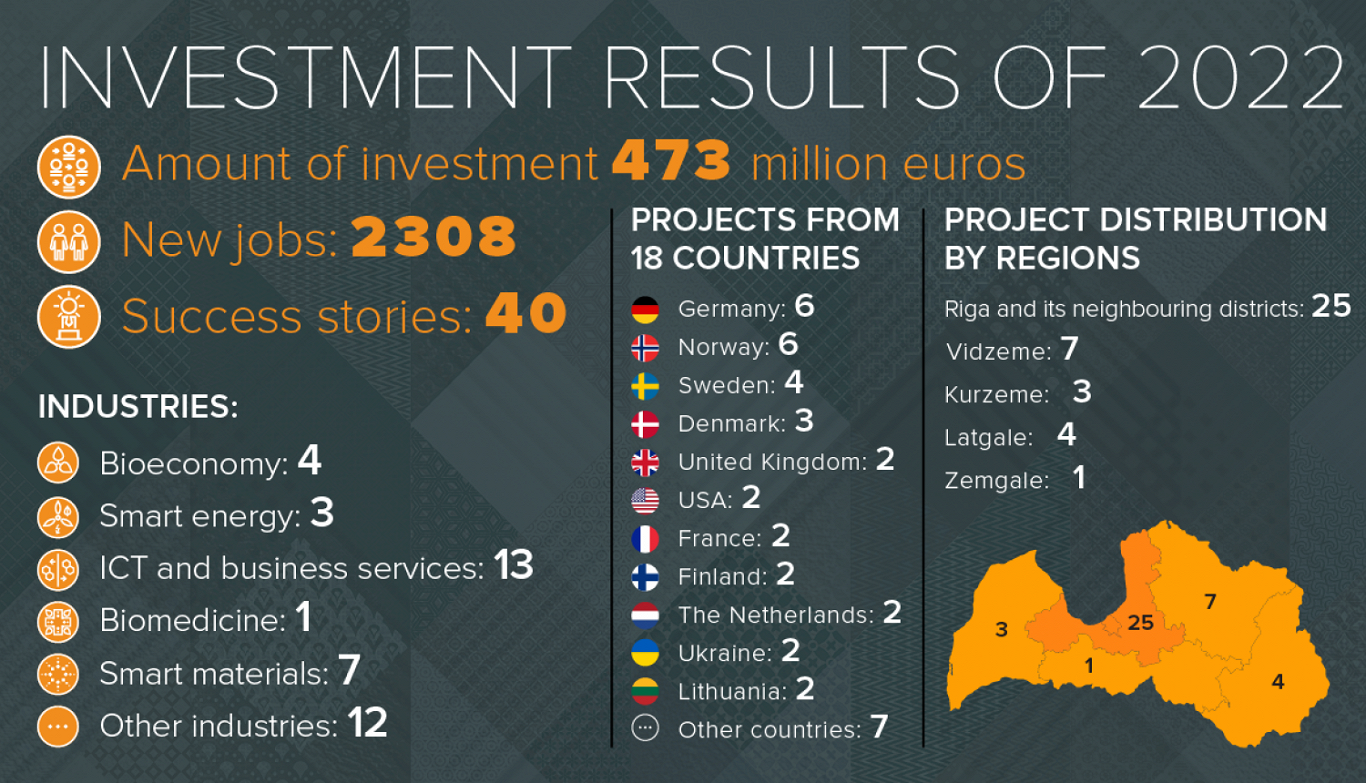Among the success stories of the past year, FORTA PRO, a modular construction company, signed an investment agreement with SAMSUNG C&T, expressing its ambition to become the world's leading modular construction company.
FORTA PRO currently has production facilities in Jelgava and Ventspils, employing 300 people, and plans to increase its workforce to 700 employees and launch several new projects this year.
Anodox Energy Systems has also announced the launch of its operations in Latvia. The Swedish company will develop battery production for electric vehicles in Latvia. Meanwhile, Enamine, a Ukrainian company and the world's leading supplier of chemical compounds and related services to the pharmaceutical industry, has started work on its expansion in Latvia.
"Although 2022 will have been the worst year in a decade according to stock market index ratings, the overall attractiveness of investment has varied between countries. The Baltic states, including Latvia, have shown good growth in attracting investment in recent years. This is largely due to the changes in global supply chains caused by the pandemic, as well as the continued availability of highly skilled professionals in the Baltic states and the reasonable costs of running a business," said LIAA.
In total, the 40 investment projects cited by LIAA involved 18 countries. Germany and Norway are the most represented with six projects each. The total investment volume listed is EUR 473 million; however, the investment volume is not disclosed for some projects, so the actual investment volume is likely to be higher.
“In the LIAA investment projects, around two thirds of the inward investment is in knowledge-intensive sectors. This marks a turning point in our ability to be of interest to high value-added industries. Working on these projects requires more insight and different working methods, but the results show that we are on the right track and the so-called economic restructuring is happening,” said the Director General of LIAA, Kaspars Rožkalns.
Latvian start-ups have also shown relatively good results in attracting investments in 2022, having attracted EUR 61 million in investments in 2022. The most notable deals were signed by Juro, Giraffe360, Aerones, Colizeum and SaltoX.
Ilze Indriksone, Minister of Economics said: “By developing the Large Investment Fund program and introducing the Green Corridor approach to investing directly in knowledge-intensive sectors, we have made a breakthrough in the implementation of high value-added projects and strengthened the interest of foreign investors to cooperate with our businesses... A positive trend is that production facilities are increasingly located outside the capital, which also means new and well-paid jobs for people in the regions.”
Last year, Latvia attracted 25% less foreign investment than a year ago, but more new jobs and higher added-value industries will be created.
"There were a lot of investment projects in 2021, but there was a very high share of energy – wind, different solar parks – which don't create very many jobs.
"There are still enough projects in energy, but enough have also emerged in other high-added value sectors that create these jobs. It is a long-term engine for the Latvian economy, and the largest contribution is to information and communication technologies and business services, as well as to the bioeconomy and smart materials segments, which means that so-called smart investments come in, production plants with high-added value that are able to pay better wages for employees and continue to be competitive. In our view, this transformation, just as the volume of investment for knowledge-based business ideas is increasing, is a very important factor," said Kaspars Rožkalns, director of the LIAA.
Latvian central bank (Bank of Latvia) economist, Matīss Mirošņikovs, said the latest data on investments attracted in three quarters of last year were encouraging.
“Direct investment transactions have been relatively large, with value for those transactions up to 6% of gross domestic product (GDP) in the third quarter. That is about twice as much as it was in the first two quarters. In the long run, we look at some 2.3% of GDP a year, then a total of 4.4% a year. And if we still take into account the fact that Russia has been a very important source of direct investment for quite a long time, there is virtually no investment now, with all of which the performance is really good,” said the economist at the Bank of Latvia.
Linda Helmane, executive director of the Foreign Investors Council, said that there are a number of issues that investors deal with in Latvia, and one of them is a constant lack of skilled labor.
"We certainly welcome the fact that both new investments are being attracted and LIAA is also working to increase investments directly from existing capital in Latvia by existing investors and entrepreneurs. [..] Unfortunately, still, labor issues are mentioned as the biggest challenges. Both accessibility and skills, and there is often a need to seek higher-skilled workforce abroad. At the moment, of course, inflation and the geopolitical situation are also mentioned, in some cases, as a reason to pause the investment," Helmane said.






























